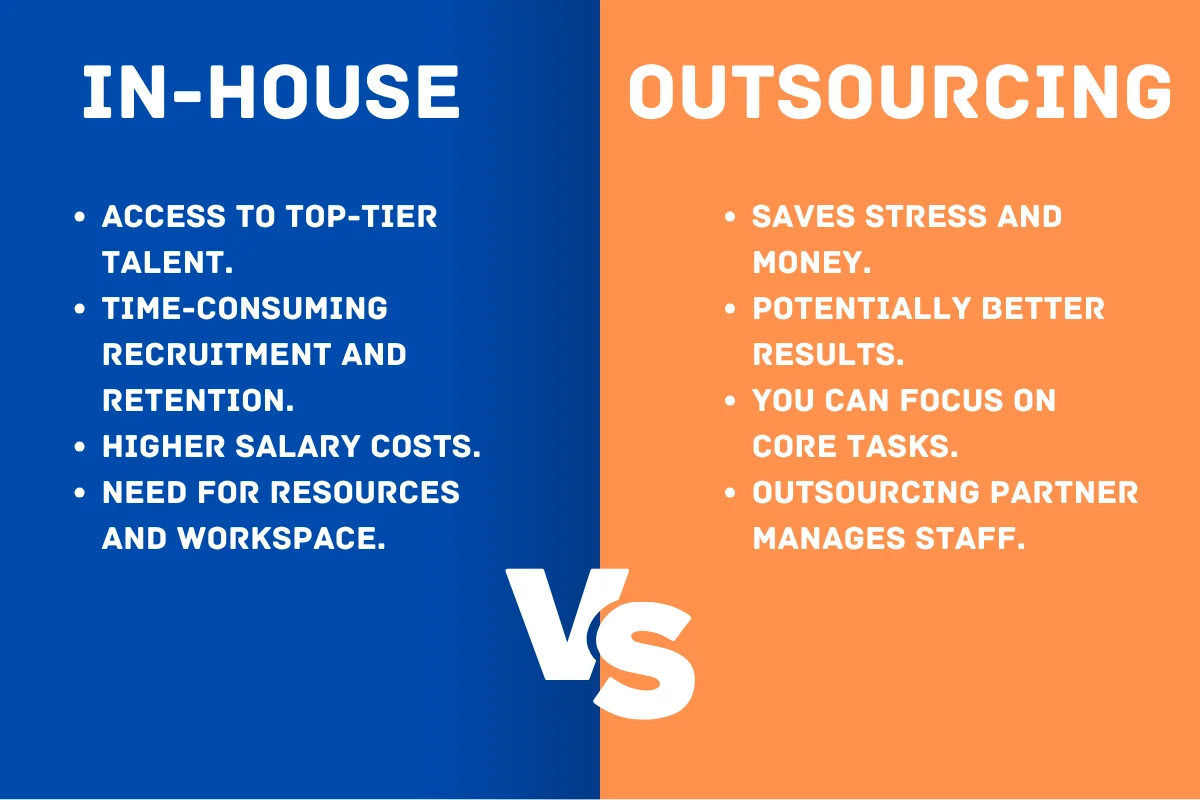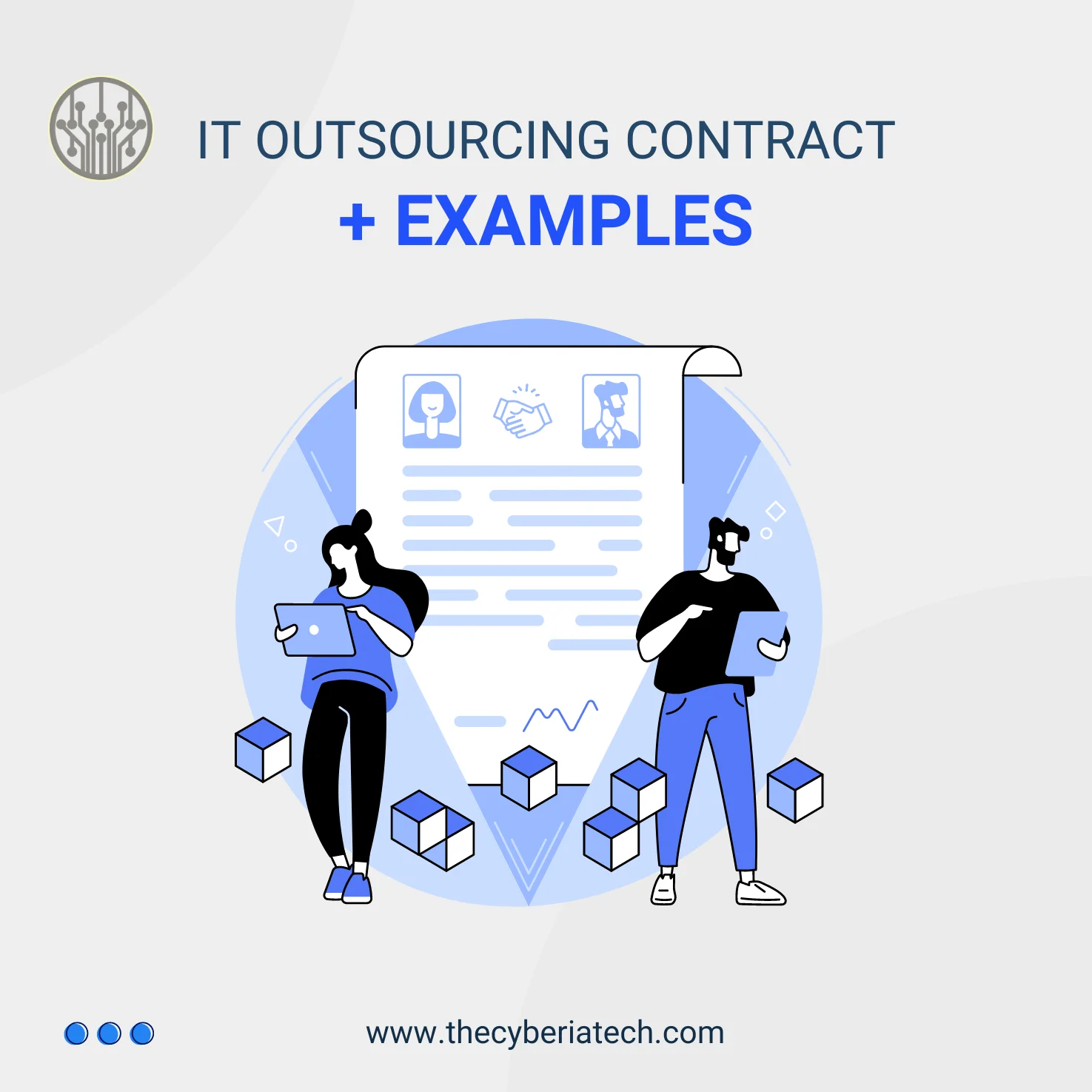In this article, we’re going to discuss outsourcing questions and answers. Outsourcing can be a fantastic tactic to grow your business, save costs and improve efficiency, if done properly. But you may have doubts about delegating your tasks to another company.
We are here to help you mitigate the risks and lessen your worries. You may not know what to ask a potential outsourcing company either. So, there is a list of questions to ask an outsourcing service provider at the end of this blog post.
Keep reading to learn helpful tips to make the most of your outsourcing initiatives.
Top Outsourcing Questions and Answers You Need to Know
You may have questions about how to manage your team, your data security, potential problems, etc. Here are some outsourcing related questions to ask, plus answers that will help you get the best results for your business:
0. How outsourcing will help my business grow?
There are numerous advantages to outsourcing. First, you’ll have access to a wide range of experts who will do your task more efficiently. Why do we say more efficiently? Because their business revolves around these core tasks (more on this later). This way, you can save time and money and focus on other aspects of your business.
Imagine you need someone to do data entry, and you need it to be done every two months. There is no need to hire a full-time workforce to accomplish it. You can hire a person or a team to do it. This way, you’ll just pay for a single task (or project) that is needed every two months.
Besides, outsourcing companies usually offer prices that are more competitive than the average (in Europe or North America). For that reason, you can lower your overall expenses.
Then you can use the saved budget for other operations, like marketing. In addition to that, your team will have more time to focus on more important tasks. Overall, assigning a third party to do side tasks not only increases productivity but also lets you spend your funds where you need it the most.
This model will cost less than paying a monthly salary. Then you can use the saved budget for other operations, like marketing. In addition to that, your team will have more time to focus on more important tasks. Overall, assigning a third party to do side tasks will increase productivity and let your business grow faster.
1. What are my objectives for outsourcing?
First of all, you have to think about your objectives with outsourcing. Decide if you want to cut expenses, improve customer support, or have more free time to focus on more important tasks.
Remember that the goal should be realistic, otherwise you can´t achieve what you want to do and you have to bear the consequences. You may be wondering how to set a realistic and achievable goal.
There is a term called the SMART goal. It’s an acronym for Specific, Measurable, Achievable, Relevant, and Time-Bound. It helps you frame an objective with a pragmatic approach that leads you towards ideal results.

Let’s learn how to define a SMART goal with an example. Let´s say you want to increase subscribers for your newsletter. Here is how you would set a SMART goal:
- Specific: You want to increase subscriptions for your newsletter by promoting it on social media.
- Measurable: Let’s say you want to increase the number of sign-ups to 10%.
- Achievable: The last time you promoted your newsletter on Instagram, it resulted in 10% more subscriptions.
- Relevant: By expanding your audience, you’ll have more leads and prospects, which will provide more sales opportunities.
- Time-Bound: You can set a date for your goal, for example, by the end of March 2024.
By determining what you want to do, you will minimise the risks of failure and increase the chances of achieving your goals.
Remember one thing: no matter what your goal is, it’s always better to share it with your team and your outsourcing partner. Informing everyone in the process helps them better understand your needs, so they can help you achieve these goals.
2. How do I decide what to outsource?
First of all, it’s essential to identify your core and non-core capabilities. It means discovering what you’re best at. For example, you have a fantastic team of designers who are capable of creating styles that are out of the ordinary. So, providing incomparable styles is a core competency for your company.
On the other hand, imagine you have to handle customer support. It’s a repetitive and time-consuming task, and your design team is kind of an introvert, not finding joy in talking to people every day. If you delegate this team to handle customers, they cannot make the most of their potential.
The best practice here is to outsource the customer support task to a reliable company that is excellent at it. They have the right people and resources to manage customer support. As a result, they do what they’re good at, and your design team will put time and effort into fostering new concepts and designs.
Actually there is no rule that prescribes the best processes for outsourcing. However, if it’s the first time you want to assign another team to do the job, it’s recommended to start outsourcing with a non-core task.
After getting some weights off of your shoulder, you can focus on your core competencies and your business will have a better chance to grow faster. And when you learned how outsourcing has helped your company, you’ll be ready to delegate more tasks to your outsourcing partner.
3. Can I outsource a core task?
While outsourcing non-strategic and repetitive tasks (like data entry) is a good step on the road to maximise efficiency, contracting others to do core tasks is not recommended by the experts.
Assigning another company to control activities related to human resources or public relations cannot contribute to your business values. You might be curious as to why. Well, the service provider may not be able to fully share your values because you´re not their only client.
Another reason not to outsource your core tasks is that these competencies include your competitive advantage. If you’re hiring another company to manage it for you, it means you haven’t built the expertise in your house. So, don’t expect another company to stick themselves to your success.
4. Does My Business Get Out of Hand when outsourcing?
The short answer is no. As you’re delegating non-key tasks to another team, you’ll have more time to focus on major vital activities such as innovation, marketing, and planning. Outsourcing (when done right) will help you grow your company by saving you time and money.
If you find the right outsourcing company, clearly define your goals and discuss your terms and conditions beforehand, everything will be alright. At the end of the day, you’re the one pulling the strings.
5. Why not recruit someone in-house instead of outsourcing?
Having top-tier employees at the office has its privileges. But it may take a lot of time and effort. Finding and keeping the right person is time-consuming, and top talents come with higher prices. Plus, having the tools, workspace, and other resources is necessary to maintain an efficient team.
At the end of the day, you’re the one pulling the strings.

By contracting third parties, you’ll save a lot of stress and money. It helps you get better results with your efforts. This way, you can fully concentrate on your main job as the outsourcing partner will take care of his own staff.
6. Is it possible for a small company to outsource?
You may be thinking that outsourcing is exclusive to big names in the industry, as small businesses sometimes have fewer procedures. But the truth is, every business of any size can assign the work to another team.
Not only can a small business save time and money, but it can also grow and stay ahead of the competition. It’s worth mentioning that there are outsourcing firms out there dedicated to helping SMEs (small and medium businesses) scale up.
7. How much access should my outsourcing partner have?
Well, it depends on you. It’s critical to set your expectations and make sure you’re involved in the process. Moreover, everything related to your financial and other sensitive data should be clear to avoid unfavourable outcomes.
The partner should be trained and well-informed about your policies. This way, both parties can benefit from doing business.
8. Why Is Transparency important in Outsourcing?
Have you ever asked yourself why you put your money in a bank? How do you know they’ll keep it safe? You do it because you trust the bank.
Building trust is key to doing business. Your outsourcing partner must be transparent about every task they are doing for you. They must inform you about any changes in your operations. It’s recommended to document everything so you can be aware of what has happened in the process.

Transparency is crucial for building trust among both parties and growing successful cooperation. It helps you know if you have chosen the right partner or if you want to continue working with the chosen company.
By communicating with the partner company and outsourcing staff, you’ll build a productive team that can achieve anything. If anything goes wrong, you can ask for explanations. Try to understand them and make suggestions when necessary to avoid further issues.
It’s good to let them know you’re available for clarification on any concern. You can set up daily, weekly, or monthly meetings to be updated and share useful information. This way, you’ll move on an efficient train that leads to success.
9. How to make sure your data is safe when outsourcing?
Have you ever heard, “Data is the new oil?”. You don’t want your assets stolen or misused by anyone, which is true for your data. You’ve come a long way in collecting valuable data, and you don’t want anybody to use that to win the competition.

Security and privacy are of great importance for every business since your outsourcing partner has access to your sensitive data. Make sure the outsourcing company meets the current standards in terms of security measures and protocols.
Paying attention to data storage and transfer, plus having a solid backup, will be a good step towards safety. The less accessible, the better. Remember to specify data and intellectual property protection in your contract.
A reliable outsourcing partner understands it and will take the necessary measures not to cause any trouble for you.
10. What to do if the outsourcing partnership fails?
People don’t use a seatbelt because they’re waiting for an accident. It’s a plan to keep them safe when things get messy. And nobody starts a business relationship hoping it will end soon. It’s just a measure to be ready for the worst-case scenario.
This plan states the terms and conditions for ending the contract, the responsibilities, the handover process, the termination costs, penalties, etc. Finally, the exit strategy helps both parties protect their interests.
11. What Are Outsourcing Costs?
There are direct and indirect costs to outsourcing. Direct costs are the ones the service provider asks you to pay. Companies have various pricing models. They may charge you weekly, monthly, per hour, per task, or per project.
Indirect costs are sometimes invisible. These costs include time and money you spend on integrating the partner into your business operations or possible expenses that are language or culture-related. We’re going to discuss cultural differences in the next section.
12. How to handle language and cultural barriers when outsourcing?
The first issue is the language barrier. As English is the international language, some countries speak a different language. This causes misunderstandings that are frustrating and counterproductive.
One way to address this problem is investing in language classes. The other solution is to provide translations of key information. Clarification will help you communicate better with your team and obtain better results.
Another matter is cultural differences. What is polite in one culture is considered rude in another one. To elaborate more on that, it’s vital to study the country’s culture to prevent any misunderstanding. You can also get help from colleagues or anyone familiar with the partner’s norms and values.
13. How to manage communications with the outsourcing partner?
It’s important to have a stable method for sharing information and ideas. Fortunately, today we’re surrounded by a long list of useful tools to manage communications.
From remote access software like TeamViewer to file-sharing services like Google Drive, you have everything you need to streamline your workflow and lead your functions towards the best outcomes.
14. What are some typical problems with outsourcing?
Every decision has its flaws. While outsourcing can boost your business productivity, it can be puzzling sometimes. Miscommunication and not being transparent can cause trouble. Not meeting deadlines, inconsistency in delivery, and security issues are among the other pitfalls of outsourcing.
(We explained how you can handle security issues.)
You have to make everything clear to get your desired results. Otherwise, your outsourcing partner can give you a hard time, and you’ll be disappointed.
Now, you may be asking how to find the right outsourcing partner. Below, we’ll answer this question.
Bonus Question: How to prepare an agreement with the service provider?
You don’t know to worry about it. Here you can read an IT outsourcing contract guide to learn about the essentials of preparing an agreement with your partners.
How can I select a reliable provider of outsourcing services?
We’re fortunate to live in the digital era. If you want to find a reliable and trustworthy company to work with, Google and Bing are your best friends. You can prepare a list of your potential providers. Then search for their achievements and awards.
Read reviews about each candidate and explore their portfolio. Study their processes and teams to find out how they work. Be aware of red flags, such as a lack of transparency. This way, you can find the best partner for your business. Besides, you can ask for a consultation session to discuss your expectations.
Request client testimonials, as a reliable company will not hesitate to provide references. You can reach out to their previous clients via LinkedIn and ask if they were satisfied with the services
Questions to ask an outsourcing company
If you have found your outsourcing candidate, this is a good place to take your first step. We have prepared a list of questions to ask your outsourcing partner to make sure you’re choosing the firm to assign your tasks:
- How long have you been doing this type of work?
- Can you show me some feedback or references from other clients?
- Can I see some of the work you’ve done before?
- Have you worked on similar projects? How did they go?
- How much do you charge, and what does that include?
- Are there extra charges on top of the usual fee?
- When do I need to pay you (like every week or month)?
- What currency do you use for billing, and how do you handle changes in currency value?
- When can you start, and how quickly can you get things done?
- Will we have regular meetings to talk about the project?
- How many people will work on my project, and who checks their work?
- How do you keep your clients’ information safe?
- Are you certified for quality and security? Have you ever had a security problem?
- How do you make sure your staff only access work stuff at work?
- Do your employees work from home, in the office, or both?
What happens if there’s a power cut or bad weather? (If the company is based in a country that suffers from power cuts)
- How do you find and choose your employees, and how fast can you get them to start working?
- How many managers or supervisors do you have for each employee?
- Can I look at your service agreement?
- How long is the contract, and what happens if I end it early?
- Can you explain the main points of our deal, like how to end the contract and any fees?
- What will I need to do as your client?
- How much time will I need to spend working with your team?
- Will I always be able to see my data and records?
- How do you keep your team happy and my project running smoothly?
- What if my project needs a change?
- How do you handle your staff’s time off and health benefits?
- How do you keep improving and stay up-to-date?
- What if we have a disagreement or problem?
- Can you show me how you plan to use your resources for my project?
- How will you inform me about the project’s progress and success?
Above all of these questions, it’s important to make everything clear before starting the project to prevent any unwanted consequences.
frequently asked questions
There are lots of factors influencing outsourcing decisions. But to give you an idea, we can mention that costs, the reputation of the service provider, their technology and resources, and communication are among the most important points.
To give the main points, we can mention these four stages: define goals, identify requirements, evaluate costs, and define metrics.
Wrapping Up
In this blog post, we listed outsourcing questions with answers to help you with your business operations. We said that assigning a third party can save you time and money, letting you focus on your main tasks. Overall, outsourcing can help your company grow if done wisely.
Furthermore, we’ve covered a list of questions to ask a service provider. This ensures you’re fully informed about the terms and conditions of your partnership. It also helps eliminate any doubts in your future contracts to prevent potential issues.







